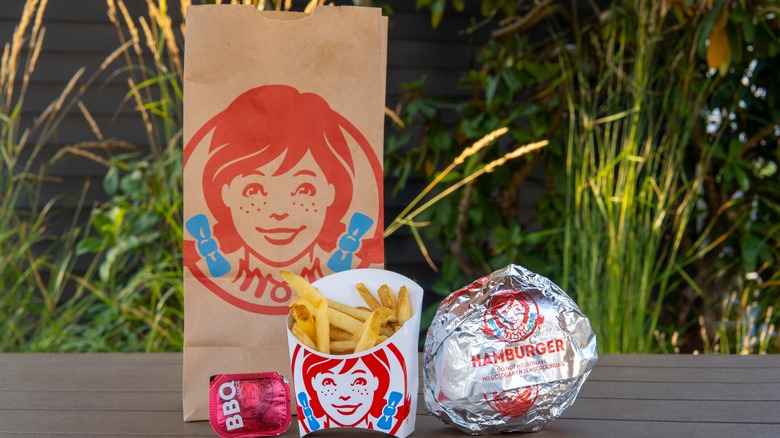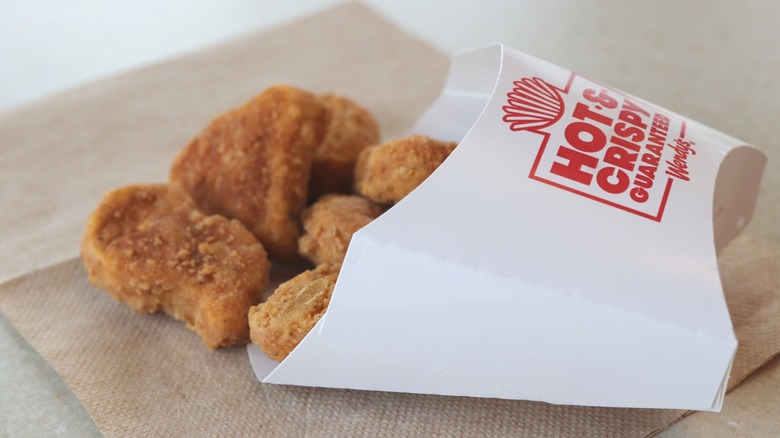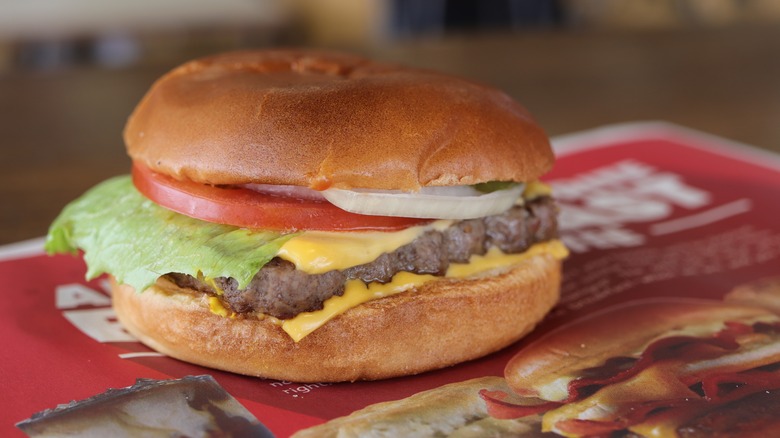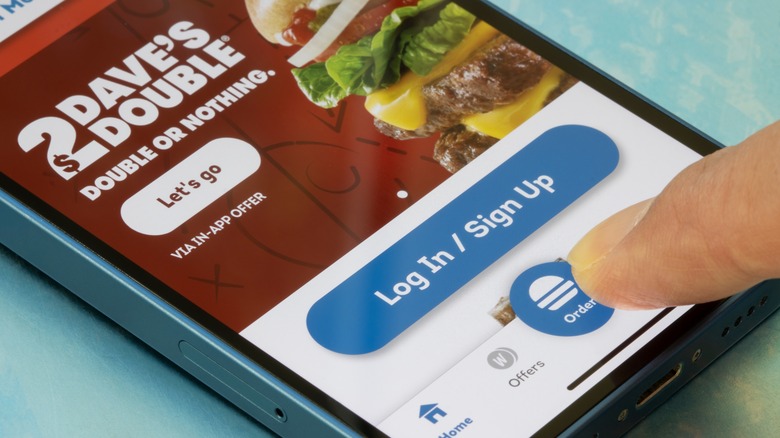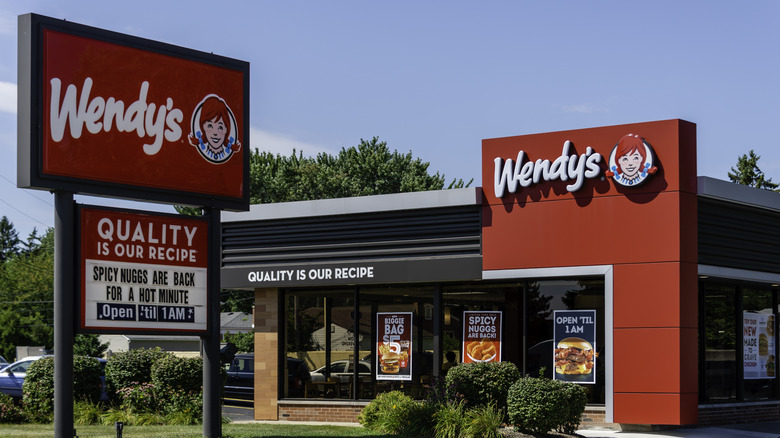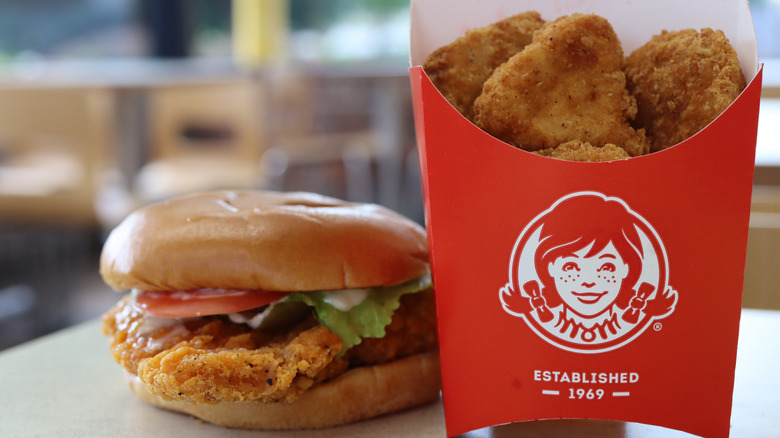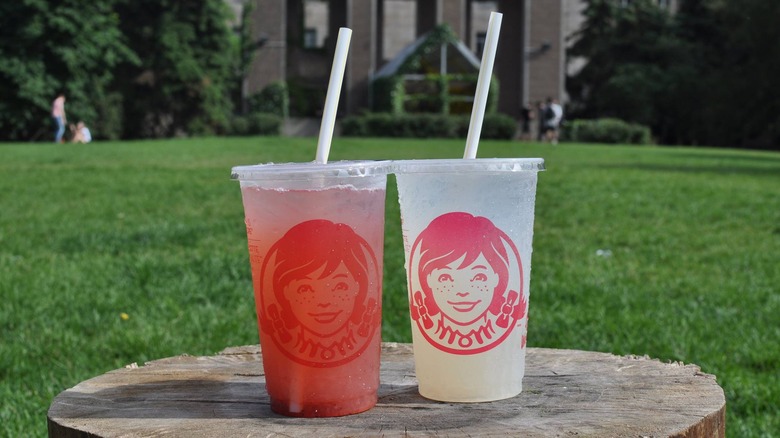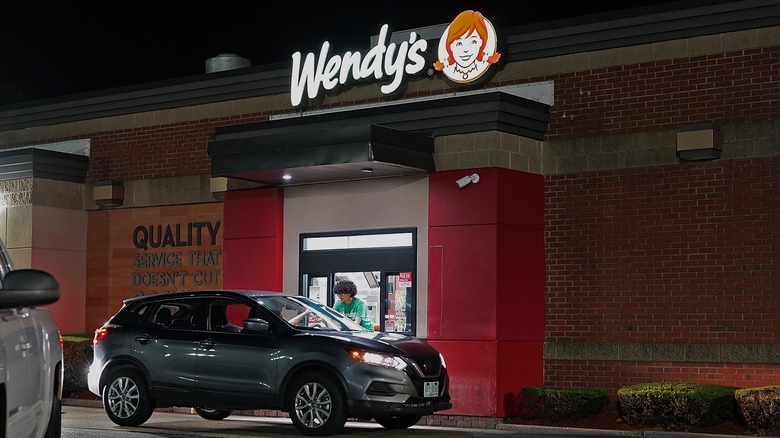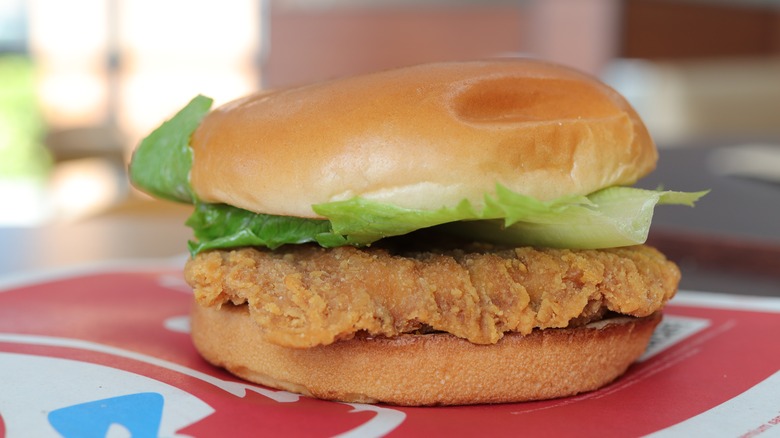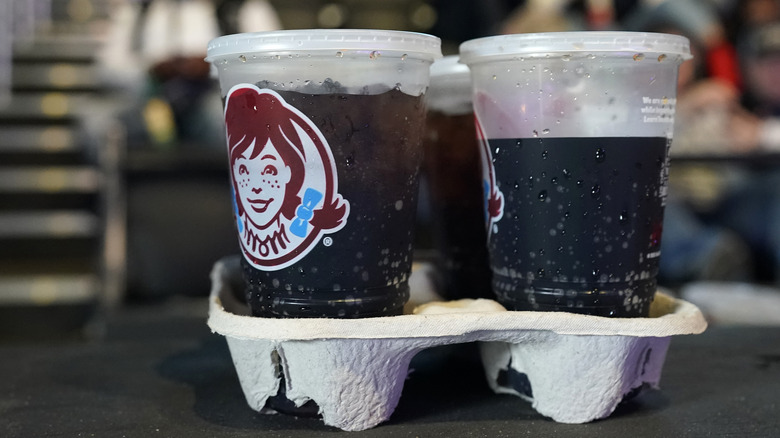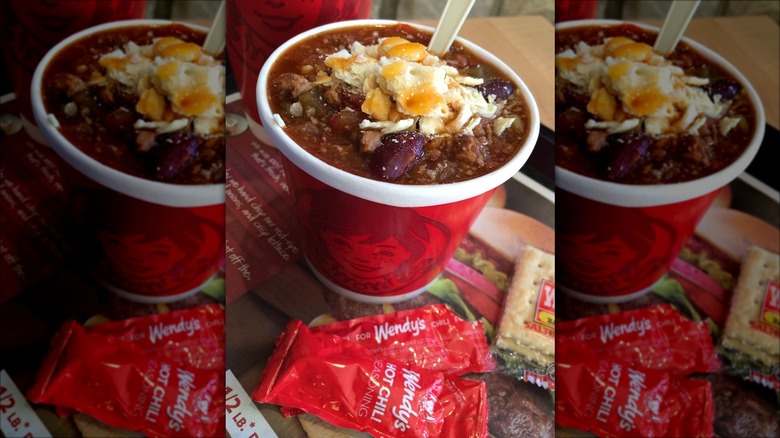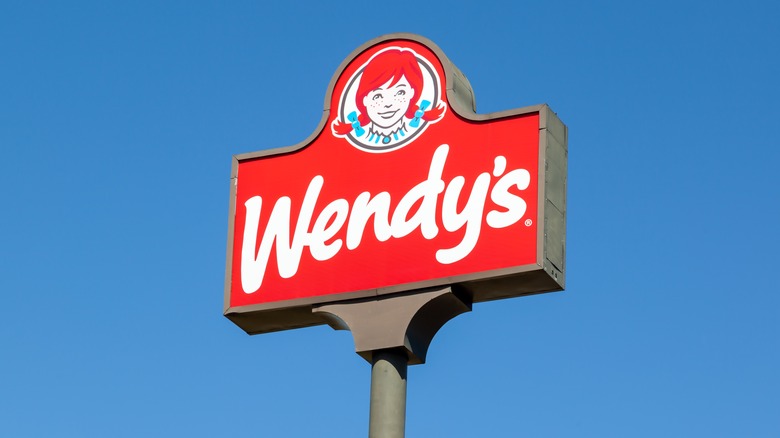Shady Things About Wendy's Menu
If there's one thing Wendy's prides itself on is it's quality. Ever since the burger joint opened its first store in Columbus, Ohio, in 1969, it's had a strict policy of never freezing its patties — instead pledging to give its customers the freshest hamburgers possible (something that's not always true of its competitors). As it promises on its website: "Wendy's is Fast Food Done Right: your go-to for real, fresh, craveable, forward-leaning food that doesn't cost a fortune."
But these good intentions don't mean that Wendy's menu is totally without its issues. Today, the chain spans over 7,000 stores reaching as far and wide as the U.K., Japan (where it's known as Wendy's First Kitchen), Guatemala, and Saudi Arabia. Like any restaurant business of this scale, it's faced its fair share of complaints and critiques over the years. While there will always be those who like to point out the lack of nutritional value on a fast food menu, some of these issues run deeper than a high amounts of fat or sodium overload. From dirty kitchens to secret ingredients, here are some of the shadiest things you probably didn't know about the Wendy's menu.
Wendy's nuggets aren't necessarily 100% white meat
For a lot of fast food fanatics, Wendy's nuggets are the best of the best. Crispy on the outside and soft on the inside, the only thing that's better than Wendy's Crispy Chicken Nuggets are Wendy's Spicy Nuggets, which come with a stellar lineup of dipping sauces (if you're not sure which one to pick, our favorite is the sweet yet smoky Wendy's BBQ).
As per the Wendy's website, the quality taste of these nuggets stems from the fact that they only use "100% white-meat chicken breaded to crispy perfection." However, this claim isn't necessarily accurate. One thing it fails to mention is just how much chicken you're getting in your nugget. According to the data science platform Kaggle – which broke down the exact chicken content of multiple fast food chain nuggets — each Wendy's Crispy Chicken Nugget is approximately 37% chicken. The other 63% is made up of breading, additives, and oils, including sodium aluminum phosphate and hydrogenated soybean oil (which, like all hydrogenated vegetable oils, has been linked to poor heart health). That's not to say that you shouldn't order them; just be aware that you're eating more than pure, protein-packed chicken when you do.
It has been accused of lying about the sizes of its burgers
If you've ever seen an advertisement for a juicy, stacked burger, topped with crispy lettuce and impossibly gooey cheese, and questioned why it looks so much better than the sad, greasy sandwich you received at a fast food drive-thru, you're not alone. Back in 2022, Justin Chimienti filed a lawsuit against Wendy's (and McDonald's) calling them out for "false and misleading advertising" that made their burgers look bigger in promotional materials than in real life.
Chimienti specifically accused the chains of undercooking its burgers when shooting advertisements, noting that beef shrinks by 25% when fully-cooked (which is why the burgers served are so much smaller than those pictured on the menu). The Washington Post quoted Chimienti as adding that Wendy's in particular claims to have "large burgers compared to competitors and containing thick and juicy beef patties stuffed with toppings," but that this simply isn't true.
In his opinion, these practices are akin to Wendy's lying to customers about portion sizes. Unfortunately, the courts didn't see things the same way. In October 2023, a federal judge dismissed the lawsuit after claiming that all companies make their products visually attractive to promote sales. Regardless of the legal outcome, it's still a stark reminder that what you see isn't always what you get at Wendy's.
Its rewards app isn't always as helpful as you'd think
In July 2020, Wendy's launched the Wendy's Rewards loyalty program. For the first time ever, guests had an app where they could collect points for their orders – 10 points for every $1, to be precise — every time they bought food via the app, or scanned an in-app QR code at the restaurant itself. You could later exchange these points for selected menu items, in essence giving you free food.
If only it actually worked. Over the years, numerous Wendy's customers have complained about the app's inefficiency. The biggest issue seems to be the app removing reward points from an order after they've been applied, which in turn makes it more expensive than planned. Others have complained that coupons offered on the app simply don't scan in-store and negatively compared it to similar apps offered by Wendy's rivals. "I'm about to lose it with this company ..." one disappointed customer wrote on Reddit. "Seriously McDonald's never has this issue and works flawlessly EVERY TIME." As if the lack of discounts isn't frustrating enough, the app also has a habit of glitching in general. All in all, you may be better off just ordering your Wendy's the old-fashioned way.
Dirty kitchens have been linked to health problems in the past
First of all, let's make one thing clear. Like all fast food chains, every Wendy's restaurant is different, which means no two kitchens are alike. Some kitchens have, however, got Wendy's into trouble in the past. In August 2022, 11-year-old Aspen Lamfers ordered a hamburger, chicken nuggets, and french fries at a Wendy's in Jenison, Michigan, only to be hospitalized with an E. coli infection days later.
It was subsequently revealed that the same kitchen had just reopened that day after an inspection shut them down days earlier. According to Wood TV, investigators had declared the Wendy's restaurant to be packed with "immediate health risks" due to its "gross, insanitary conditions," including mold and mildew, spoiled food, and undated produce. With the infection later attacking Lamfers' kidneys and brain, her family sued Meritage Hospitality Group (a widespread Wendy's franchisee) for $20 million.
Lamfers wasn't the only Wendy's customer struck by an E. coli infection in 2022, either. Between July and August, the Centers for Disease Control and Prevention linked Wendy's restaurants to at least 97 cases across Indiana, Michigan, Ohio, and Pennsylvania. It's thought that the outbreak stemmed from bacteria-ridden romaine lettuce. While Lamfers didn't eat any lettuce on the day she got sick, her family's attorney has argued that cross-contamination was inevitable considering the conditions in the kitchen.
Its food may contain hidden plastics (especially the nuggets)
In January 2024, Consumer Reports came out with a study that did a great job of alarming fast food lovers — especially those with a taste for Wendy's Crispy Chicken Nuggets. Having assessed a variety of foods from not just Wendy's but McDonald's, Burger King, Chipotle, and more, it found that multiple menu items contained alarming levels of phthalates (aka the chemicals that make plastic soft and flexible).
Of all those tested, it was the Wendy's Crispy Chicken Nuggets that snagged the undesirable number one slot. Just one serving was found to contain 33,980 nanograms of phthalates. That's nearly 10,000 more than the runner-up, Moe's SouthWest Grill's Chicken Burrito. While the nuggets don't exceed the phthalate limits set by regulators in the U.S. or Europe, phthalates been linked to everything from heart disease and diabetes, to certain cancers and neurodevelopmental disorders — even when consumed at levels below these limits. This all comes down to the fact that phthalates are known endocrine disruptors, interfering with the way our bodies produce and regulate hormones.
The silver lining is that not every Wendy's menu item tested produced such concerning results. Its Wendy's Dave's Single Hamburger Patty even ranked towards the bottom of the fast food items tested, with 3,629 nanograms per serving. Still, for a restaurant that prides itself on fresh, high-quality ingredients to rank so highly is pretty alarming.
The lemonade isn't as fresh as you think
Wendy's may market its lemonade as "all-natural," but you'd be mistaken for thinking that means it's fresh. Multiple employees have exposed the secrets behind the infamously sweet iced beverage over the years. In 2022, one Wendy's worker racked up 4.3 million views after sharing a TikTok exposing how the restaurant whips up its strawberry lemonade in particular. First, pre-packaged strawberry purée is dumped into a container. Next, comes lemonade from a carton (in this case, it's Hubert's Lemonade, which contains artificial preservatives such as sodium benzoate), which is then mixed with tap water and poured into the dispenser. It's all very simple – but notably free of any actual lemon-juicing or, well, lemons.
Another Wendy's worker also exposed the lemonade's not-so-wholesome origins to Insider, noting that while there are often sliced lemons in each restaurant's display pitcher, "the lemonade [they] would make at [their] store was just about as 'fresh' as the powder you mix with water at home." While there's nothing inherently bad about that, it still stretches the definition of an "all-natural" lemonade a little too far for our liking.
Customers have complained about its upselling tactics
From fast food chains to Michelin-starred restaurants, the majority of dining destinations are trying to upsell you in some way. The real question is whether they manage to do so subtly enough that you don't complain. At Wendy's, guests have definitely noticed the upselling tactics used by some employees, and they aren't too happy about the restaurant trying to wrangle more coins from their wallets.
In March 2024, one customer made headlines after claiming that a Wendy's employee had persuaded them to order a bigger sized drink — then allegedly admitted that they were encouraged to upsell by management (via The U.S. Sun). Other customers have made similar complaints, with one Reddit user detailing an incident where an employee told them that the small size didn't exist anymore so they'd order a medium, only for them to find out this was not the case by checking the Wendy's app. "I guess now Wendy's is forcing people to pay for a medium," they wrote.
While not every restaurant follows this practice, several employees chipped in on the same thread to claim that it's common practice for management to encourage asking customers whether they want a medium or large and only offering a small if requested. "We HAVE to ask 'medium or large' for sizes because it's not particularly good for our stores to sell small and our managers will yell at us if we don't ask medium or large," one employee wrote on Reddit.
Not all of the meat is fresh — just the beef
Wendy's is extremely proud of its fresh beef — so much so, that it often takes centerstage in its marketing materials (hence the tagline "fresh, never frozen"). You'll be pleased to know that this isn't just talk. Employees have confirmed that Wendy's does, in fact, never freeze its beef patties, and instead just keeps them refrigerated at all times.
Unfortunately, that "fresh, never frozen" concept doesn't apply to other meats on the menu. Wendy's chicken products — such as the Classic Chicken Sandwich, Grilled Chicken Wrap, and Crispy Chicken Nuggets — apparently all arrive into the store frozen. They're then transferred directly from the freezer to the fryer (except for the grilled chicken, of course, which hits the grill). According to an employee on Reddit, these are very rarely fried-to-order, meaning they're transferred to a warmer, where "the quality will decrease rapidly after about 30 minutes."
Depending on where you're ordering your Wendy's burger, there's a chance that even the beef has been frozen. Wendy's fresh beef patties are apparently only available in the mainland U.S., Alaska, and Canada. So, if you're calling in a Dave's Double Cheeseburger in Hawaii (where sourcing fresh beef is much more challenging) or one of the other countries dotted across the globe with a Wendy's restaurant, just be aware that the same rules don't apply everywhere.
Customers think portion sizes are shrinking
Shrinkflation is the name given to a very real phenomenon in the food industry. A direct product of inflation, shrinkflation means that the businesses behind restaurants, supermarkets, and suppliers are providing smaller portion sizes — or swapping out key ingredients for cheaper alternatives — to try and retain or boost their profits.
While you're unlikely to catch many fast food chains openly admitting to participating in shrinkflation, it's pretty easy to see it in action. Multiple Wendy's customers have complained about dwindling portions in recent years. Patrons have shared pictures of everything from microscopic nuggets to disappointing chicken wraps, with the drink sizes attracting particular ire. In March 2024, a TikTok user called out Wendy's for shrinking the size of its small iced coffees, which she claimed are now more comparable to its kid's drink cups — something a Wendy's employee allegedly told her to be true.
If this is the case, that would be at least the second time Wendy's has downsized its drinks, with customers noting another change in 2022 when the chain switched to eco-friendly cups. According to a Reddit user who claimed to be a corporate Wendy's manager, this saw the small go from 20 ounces to 19 ounces, the medium from 32 ounces to 27 ounces, and the large from 40 ounces to 35 ounces. Quite the downgrade.
Chili has proven divisive thanks to one ingredient
Burgers may be Wendy's main shtick, but there are plenty of customers who are just as excited by its chili. A tantalizing mix of beef, veggies, chili beans, and spices (not to mention surprisingly nutritionally balanced at 240 calories, 6 grams of fiber, and 16 grams of protein in every serving), it's been a staple at the chain since the doors first opened for its Ohio location in the 1960s.
Nobody's debating the flavor factor of Wendy's Chili, but there are those who are shocked when they find out how it's made. Wendy's uses the same "fresh, never frozen" beef for its chili as it does its burgers. The only difference is that the chili gets the old, dried up meat that's been deemed insufficient to serve as a hamburger. As one former Wendy's employee explained on Reddit, this meat is then reheated, chopped up, mixed with other ingredients, and cooked on the stove. "If there was old chili it was mixed into the batch and all was cooked together," they added. While some have heralded this as a smart way for Wendy's to cut down on food waste — as ultimately, the meat is still perfectly fine to eat — others have vowed off the chili completely after discovering the truth behind its preparation.
The idea of Uber-esque surge pricing sparked mass panic
Wendy's CEO and president, Kirk Tanner, caused full-blown panic in February 2024 when he told investors that the chain would soon start experimenting with a new pricing tactic. The idea was that Wendy's would use dynamic pricing to increase and decrease menu prices depending on demand, similar to the surge pricing systems used by the likes of Uber and Lyft. Tanner also suggested that AI would play a critical role once it started rolling out digital menu boards by the end of 2025.
Unsurprisingly, customers were not happy at the idea of paying more for a Dave's Double just because they fell hungry at the same time as hundreds of other customers. Fans soon called for a nationwide boycott, fearing that it would set an unwelcome precedent. "We cannot allow that idea to take hold in this country," said one furious Reddit user. "Once they start it and if they make money on it every food place will do it, then every company will do it grocery stores shopping retail services everybody will be in on it."
Luckily for the dissenters, Wendy's soon backtracked and clarified that it would not implement surge pricing. "We have no plans to do that and would not raise prices when our customers are visiting us most," spokeswoman Heidi Scheuer told The Washington Post. However, some customers remain unconvinced. "Too late," said one on Reddit. "They already showed their intentions and lost my business."
